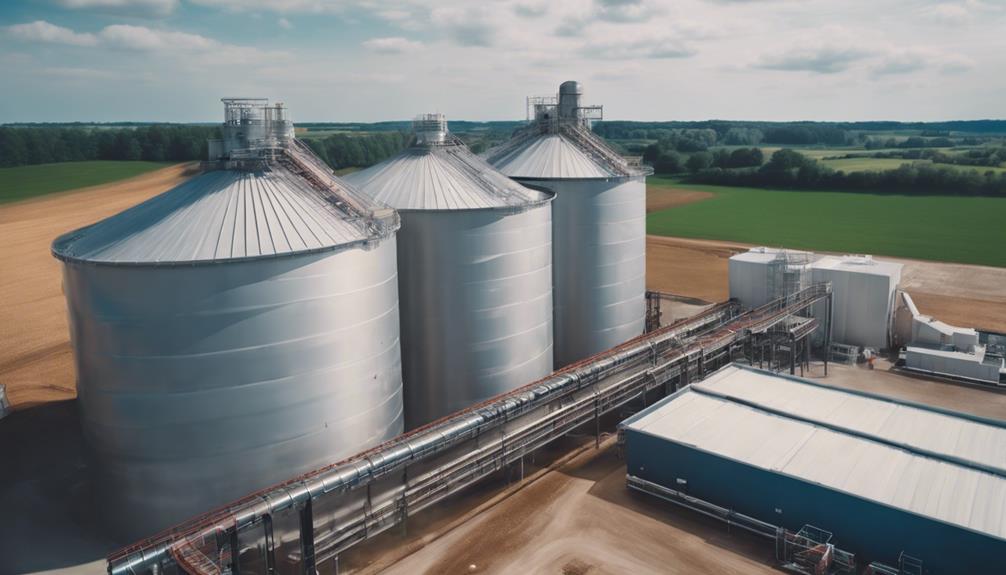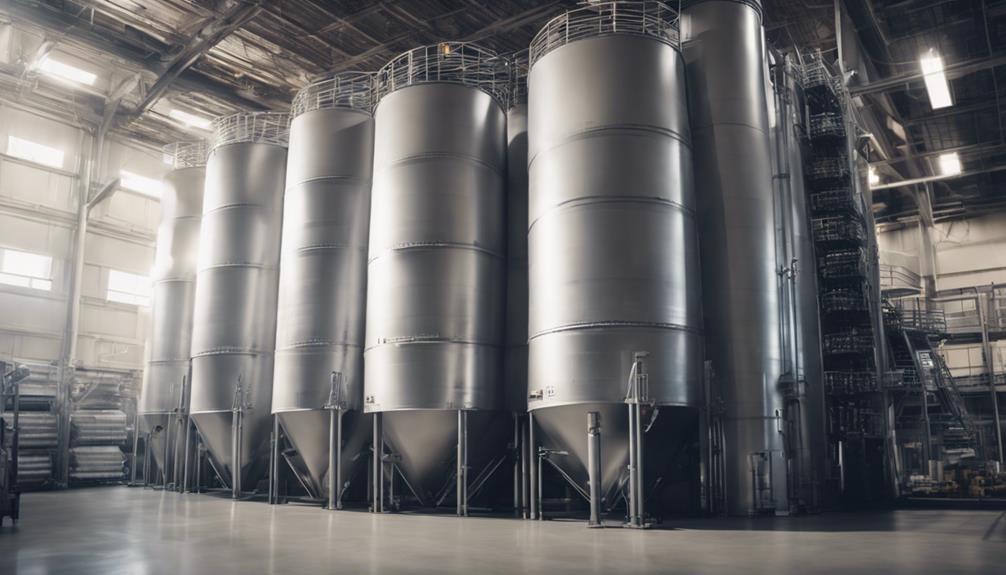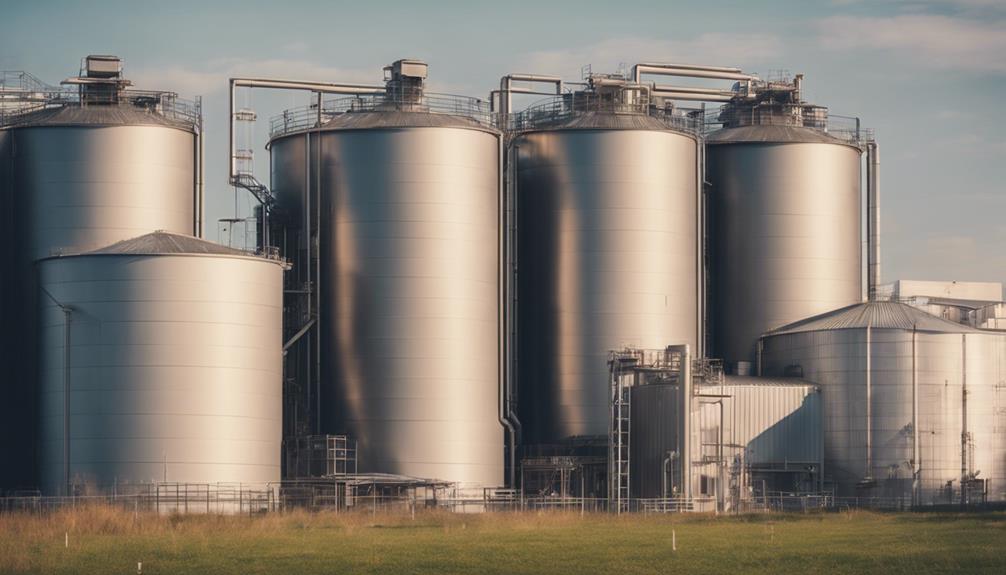Bulk storage silos enhance productivity and profitability by optimizing storage efficiency, reducing overhead costs, increasing space utilization, cutting operational expenses, and improving safety measures. Implementing conveying systems, safety features, and FIFO principles further enhance operational efficiency and material handling. The centralization of storage, protection against external factors, and streamlined retrieval systems contribute to this. Understanding the impact of silos on material handling processes is important for boosting efficiency and profitability. Expanding on these insights can provide a deeper understanding of how bulk storage silos revolutionize productivity and profitability.
Key Takeaways
- Optimizes storage efficiency and space utilization.
- Reduces operational expenses and overhead costs.
- Enhances safety measures in material handling.
- Centralizes storage for streamlined operations.
- Improves productivity, leading to profitability.
Silo Integration with Conveying Systems

Incorporating conveying systems into silo operations streamlines the transfer of bulk materials, optimizing efficiency and reducing labor costs. When considering the integration of conveying systems with storage silos, selecting a reputable storage silos manufacturer is vital. A reliable manufacturer will guarantee seamless compatibility and efficient functioning between the silo and conveying system.
Storage Silos Safety Features and Monitoring Systems
When focusing on the operational aspects of bulk storage silos, the implementation of robust safety features and efficient monitoring systems becomes paramount. Safety features in storage silo design are critical for guaranteeing the stability and integrity of the structure. These features typically include robust construction using durable materials to withstand the pressures exerted by stored materials and external elements.
Monitoring systems play a key role in tracking inventory levels, detecting issues such as leaks or temperature variations, and maintaining ideal storage conditions. Automated monitoring systems provide real-time data on critical parameters like temperature and humidity, enhancing safety and preventing potential hazards. Safety protocols within silos prioritize the protection of both personnel and stored materials. Regular inspections and maintenance of safety features and monitoring systems are essential to guarantee the continued safety and efficiency of bulk storage silos.
FIFO Principle Implementation in Silos

The implementation of the FIFO principle in silos is essential for optimizing inventory management and minimizing material waste. FIFO, which stands for ‘first in, first out,’ guarantees that the oldest materials are used first, reducing the risk of spoilage and maintaining product quality. By following the FIFO principle in silos, businesses can streamline material handling processes, reduce storage costs, and enhance operational efficiency. This approach is particularly critical in industries where product quality and shelf life are paramount.
Implementing FIFO in silos enables companies to maximize the use of materials effectively, minimize losses due to expired or obsolete stock, and ultimately enhance profitability. By prioritizing the consumption of older inventory before newer stock, businesses can prevent waste, improve inventory turnover rates, and make sure that resources are utilized efficiently. Overall, the adoption of the FIFO principle in silos plays a crucial role in enhancing productivity and profitability in various industrial settings.
Impact of Silos on Material Handling
The operational efficiency of industrial processes is greatly influenced by the way silos impact material handling, optimizing storage and retrieval systems. Grain storage silos play an important role in streamlining material handling operations by centralizing storage and facilitating efficient retrieval processes. By enabling FIFO (First In, First Out) handling, silos effectively reduce waste and optimize inventory management, ensuring that older materials are used first before newer ones. Additionally, silos provide protection against external factors such as moisture, pests, and contamination, which helps maintain the quality of stored materials.
Efficient material flow within grain storage silos enhances overall productivity by minimizing downtime and optimizing operations. This improved flow also contributes to better inventory control and tracking. Moreover, silos enhance safety in material handling processes by controlling access and promoting adherence to safety protocols. Overall, the impact of silos on material handling is significant, leading to increased efficiency, reduced waste, improved inventory management, and enhanced safety measures.
Enhancing Operational Efficiency with Silos

With the integration of silos, operational efficiency in industrial processes experiences a significant enhancement through streamlined material handling and optimized storage solutions.
Cement storage silos play an important role in this enhancement by optimizing space utilization through vertical storage, maximizing the storage capacity within a compact footprint.
The centralized storage provided by silos enables efficient inventory management by enhancing monitoring and tracking capabilities, ensuring that materials are readily accessible when needed.
Additionally, silos prioritize safety with their robust construction and controlled access, safeguarding both personnel and materials within the facility.
By reducing operational costs over time, silos minimize the need for additional storage facilities and optimize expenses, contributing to significant cost savings.
Through improved inventory management, reduced waste, and enhanced operational efficiency, cement storage silos streamline industrial processes, making them a valuable asset for enhancing overall operational efficiency and productivity.
Profitability Boost Through Bulk Storage Silos
Enhancing profitability through the strategic implementation of Bulk Storage Silos can revolutionize industrial operations by optimizing storage efficiency and reducing overhead costs. Chemical storage silos play an essential role in boosting profitability by increasing space utilization and cutting operational expenses. By efficiently managing inventory within these silos, businesses can closely track usage, minimize waste, and enhance overall cost-effectiveness. Additionally, the safety features integrated into bulk storage silos not only guarantee the well-being of personnel but also protect the stored materials, contributing to improved profitability.
Over time, the cost savings achieved through bulk storage silos are substantial as they diminish the necessity for additional storage facilities, thereby reducing capital expenditure. Centralizing materials in silos streamlines management processes, enhances operational efficiency, and ultimately maximizes profits. By leveraging the benefits of chemical storage silos, businesses can drive profitability by optimizing resources, improving safety measures, and streamlining operations for long-term success.
The bulk storage silos play a vital role in enhancing productivity and profitability in various industries. By integrating with conveying systems, implementing safety features and monitoring systems, adhering to the FIFO principle, and improving material handling, silos contribute to operational efficiency. Ultimately, the use of bulk storage silos can lead to increased profitability through optimized storage and handling of materials. Get free inquiry now!
Frequently Asked Questions on Bulk Storage Silos
What are the Benefits of Storage Silos?
Storage silos offer secure, efficient, and organized storage solutions for bulk materials. Benefits include optimized inventory management, protection against environmental factors, space-saving designs, and streamlined material handling processes. These advantages contribute to operational efficiency and cost-effectiveness.
What is the Importance of Silos in the Industry?
The importance of silos in the industry lies in their ability to optimize storage space, streamline inventory management, prioritize safety, and reduce operational costs. Silos contribute notably to increased productivity and profitability across various sectors.
What are the Advantages of Bulk Storage of Grains?
Bulk storage of grains in silos offers numerous advantages. It optimizes space, protects against pests, and guarantees grain quality. Silos streamline inventory management, provide convenient loading, and maintain ideal storage conditions. They are durable and cost-effective.
Why are Silos Useful?
Silos are useful for their efficient storage capabilities, ensuring bulk materials like cement, fly ash, and alumina remain protected and organized. They offer customized designs, compatibility with conveying systems, and ideal capacity to meet specific storage needs.

